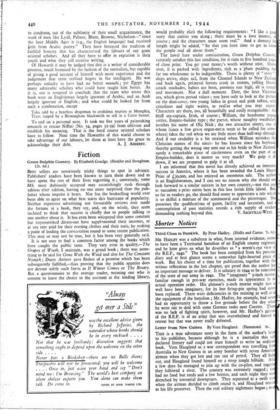Fiction
BEST sellers are notoriously tricky things to spot in advance. Publishers' readers have been known to turn them down and to have spent the rest of their lives regretting it ; conversely, some MS. most dubiously accepted may astonishingly rush through edition after edition, leaving no one more surprised than the pub- lisher whose imprint it bears. Nor has the bookselling world ever been able to agree on what first starts this hurricane of popularity. Neither expensive advertising nor favourable reviews ever made the fortune of a book, they say, and, on the whole, they seem inclined to think that success is chiefly due to people talking to one another about it. It has even been whispered that some constant but impoverished diners-out have supplemented their incomes, or at any rate paid for their evening clothes and their taxis, by making a point of leading the conversation round to some recent publication. This may or may not he true, but it has been very generally said.
It is not easy to find a common factor among the books which have caught the public taste. They vary even in quality,—The Grapes of Wrath, I maintain, was a grand book ; there was some- thing to be said for Gone With the Wind and also for The Constant Nymph ; Dusty Answer gave flashes of a promise which has been subsequently fulfilled,—thus proving that the public appetite does not devour solely such feasts as If Winter Comes or The Rosary. But a questionnaire to the average reader, meaning one who is content to leave the choice to the assistant at the lending library,
would probably elicit the following requirements: " I like a good story that carries you along ; there must be a love interest, of
course ; and the characters must seem real." And a demand fo; length might be added, " So that you have time to get to kno-5 the people and all about them."
The novel here under consideration, Green Dolphin Counti, certainly satisfies this last condition, for it runs to five hundred pa of close print. You get your money's worth without stint. More- over, it is packed with ingredients, rich as a plum pudding but far too wholesome to be indigestible. There is plenty of " story " ships arrive, ships sail, from the Channel Islands to New Zealand and back again, primeval forests crash in storms, yelling Maori -attack stockades, babies are born, passions run high, all is tumult and movement. Not a dull moment. Date, the later Victorian era, which gives period values ; you have only to look at the picture on the dust-covet, two young ladies in green and pink taffeta, ‘‘it.-, crinolines and tight waists, to realise what you may expect. Characters are there, too, all beautifully and easily recognisable: bluff sea-captain, Irish, of course ; William, the handsome young settler, Empire-builder type ; the parrot, whose naughty vocabulary justifies his name of Old Nick ; the two attractive sisters, one Hof whom (since a few grave organ-notes seem to be called for some- where) takes the veil when we are little more than half-way through.
And if our credulity is a bit strained when William mistakes the Christian names of the sisters he has known since his boyhood, thereby getting the wrong one sent out as his bride to New Zealand, surely a remarkable piece of carelessness even on the part of an Empire-builder, does it matter so very much? We gulp it all down, if we are prepared to gulp it at all.
I am informed that this novel has already achieved an immense success in America, where it has been awarded the Louis Mayer Prize of £30,000, and has enjoyed an enormous sale. The author is an Englishwoman, and I can see no reason why she should not look forward to a similar success in her own country,—not that any sc succulent a prize exists here in this less lavish little island. But so far as readers go, she should find many to appreciate a tale which is so skilful a mixture of the sentimental and the picaresque. She possesses the qualifications of gusto, facility and invention, and a contemplation of past statistics reveals a rich supply of readers


























 Previous page
Previous page